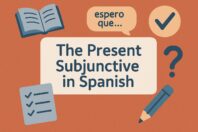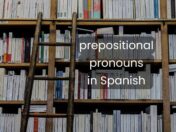The Perfect Infinitive in Spanish: Structure, Usage, and Examples

Get our free email course, Shortcut to Conversational.
Have conversations faster, understand people when they speak fast, and other tested tips to learn faster.
More infoIn Spanish, we have many verb forms. The base form of a verb is known as the infinitive, from which we derive the conjugated forms and the impersonal forms. One such impersonal form is the perfect infinitive, in Spanish known as the infinitivo compuesto.
In today’s post we’re going to focus on this verb form in Spanish, also sometimes referred to as the compound infinitive. We’ll start with an explanation of this verb form’s structure, then present its different uses. As we do in all our posts, we’ll provide plenty of examples to demonstrate each use of the Spanish perfect infinitive form.
Without further ado, let’s dive in!
Structure of Perfect Infinitive in Spanish
The perfect infinitive in Spanish bears this name because it’s built on the infinitive form of the perfect auxiliary verb haber. The structure of any Spanish verb’s perfect infinitive is simple: [haber] + [past participle]. That’s it!
- I should have gone to school yesterday. – Debería haber ido a la escuela ayer.
- I hope to have been of help to you. – Espero haberte sido de ayuda.
- Thank you for having let us know on time. – Gracias por habernos avisado a tiempo.
- It was a great success to have signed that contract. – Fue un gran acierto haber firmado ese contrato.
This structure is quite simple because the auxiliary verb haber always remains the same: it’s in the infinitive. You just need to know the participle of the main verb; this is the exact same participle that composes all of the other perfect forms in Spanish conjugation. Take a look at our post on participles in Spanish for a full lesson on this verb form.
Since the infiitivo compuesto is an impersonal verb form, it never changes to reflect a different subject. Whether speaking about one person or many, about yourself or someone else, or about men or women, the Spanish perfect infinitive always keeps the same form.
The other important detail you may have noticed in our examples is that any object pronouns are attached directly to the infinitive auxiliary haber. To keep these clear throughout this post’s example sentences, we’ll put the perfect infinitive in bold and the object pronouns in italics.
- Martín had cooked a barbecue. After having eaten it, we went to the park. – Martín había hecho asado. Después de haberlo comido, fuimos al parque.
- Thank you for the prize. Really, thank you for having given it to me. – Gracias por el premio. Gracias por habérmelo dado, de verdad.
The Perfect Infinitive in English
So far in our examples, we’ve seen a couple of different ways to translate the Spanish perfect infinitive into English. This is because the English version is much less common than in Spanish, so it often sounds better to use different wording in the English translation. But technically, what is the direct translation of the infinitivo compuesto in English?
The perfect infinitive follows the exact same structure in English that we use in Spanish. You start with the infinitive of your auxiliary verb to have, and then you follow it with the action verb’s past participle. Applying this format to some of the verbs we saw above, we get to have gone, to have eaten, and to have given.
The other common translation into English is to replace the auxiliary verb’s infinitive with the gerund (the -ing form), while still following with the action verb’s participle. In other words, you often start with having rather than “to have.” The same verbs would therefore be translated as having gone, having eaten, and having given.
Finally, depending on the context where it’s being used, the Spanish perfect infinitive might simply be translated into English with the action verb’s gerund on its own. The same verbs would just be going, eating, and giving.
Whereas in Spanish the infinitivo compuesto is generally the best option for the uses we’ll introduce next, the best English equivalents may be any of these. The meaning remains the same, but one usually just sounds better in English than the other.
When to use Perfect Infinitives in Spanish
The perfect infinitive may be used in a variety of situations to express different meanings and intentions. It is normally found after certain prepositions, or as a complement to another action verb in the sentence.
Now let’s see when to use the perfect infinitive in Spanish. To demonstrate what we saw in the last section, we’ll include a couple of English versions for some of our examples in order to demonstrate different possible translations.
To refer to a prior action that led to another action
The infnitivo compuesto is used to refer to an action or event that happened prior to another action or event.
- Having crossed the street, we saw Pedro. – Al haber cruzado la calle, vimos a Pedro.
- After having won the first prize, Mariela was very proud. – Después de haber ganado el primer premio, Mariela estaba muy orgullosa.
- Having done all the exercises in this chapter, now I write better in Spanish. – Por haber hecho todos los ejercicios de este capítulo, ahora escribo mejor en español.
In the first example, crossing the street happened just before seeing Pedro; in the second one, Mariela first won the prize and then she was proud; in the last one, I did the exercises first and then I wrote better.
To express gratitude to someone for having done something
If you’re the kind of person who loves to show gratitude and be thankful, these examples will help you vary your expressions of thanks in Spanish. You can start with one of the common verbs to show gratitude, whether gracias or agradecer, and then follow with the perfect infinitive of the other person’s action that you’re thankful for.
- Thank you for coming. – Thank you for having come. – Gracias por haber venido.
- Thank you for helping us. – Thank you for having helped us. – Gracias por habernos ayudado.
- They really appreciated me for paying the bill. – Me agredecieron mucho haber pagado la cuenta.
To regret or reproach
If you’re thinking something should have been done, whether as a regret or as a reproach to someone else, the perfect infinitive is a suitable verb form to describe what could have been. Depending on how you frame the sentence, the introductory clause may be in indicative, conditional, or subjunctive.
- I wish I had gone with you. / You should have said it before! – Me hubiera gustado ir con ustedes. / ¡Pues haberlo dicho antes!
- You should have eaten more vegetables. – Deberías haber comido más vegetales.
- His sin is having stolen so much money. – Su pecado es haber robado tanto dinero.
The Perfect Infinitive as the subject
The perfect infinitive in Spanish may function as a noun. In this way, the past action it refers to can act as a third-person singular subject of the sentence, whether on its own or as part of a bigger phrase. This is best explained with examples: we’ve marked the full phrase that constitues each sentence’s subject here with [square brackets].
- [To have adopted those kids] was amazing. – [Haber adoptado esos niños] fue genial.
- [Having found love] was beautiful. – [Haber encontrado el amor] fue hermoso.
- [Going to therapy] was the best has ever happened to me. – [Haber ido a terapia] fue lo mejor que me pasó.
After certain prepositions
As in English, some Spanish verbs are used with specific prepositions. In Spanish, when the main verb of the sentence is followed by por or de, it’s common that we can use the perfect infinitive to describe a past action that relates to the main verb. Again, this is best demonstrated with examples.
- How fortunate I am to have met you! – ¡Qué afortunado soy por haberte conocido!
- He apologized for having talked to you like that. – Se disculpó por haberte hablado así.
- She wanted to travel after finishing her summer work. – Quería viajar después de haber terminado con su trabajo de verano.
Conclusion
And with that, we’ve covered the main points you need to know about the perfect infinitive in Spanish, having discussed its structure and English equivalents, and then having gone through some of the main instances where it can be used.
We saw that a lot of the English translations have slightly different forms, but the main point to have grasped is that the infinitivo compusto is a very common and useful verb form in Spanish!
Exercises: El Infinitivo Compuesto
Do you think you’ve gotten the hang of the Spanish perfect infinitive by now? Why not see how you do with these practice exercises.
Just fill in the blanks with the perfect infinitive of the verbs in parentheses, and determine how you would translate the resulting sentence into English. The answers are below.
1. Lo mejor de mi trabajo como fotógrafo es _____ a tantos famosos. (conocer)
2. Lo expulsaron de la iglesia por _____. (gritar)
3. _____ a Buenos Aires te ha ayudado a conseguir un trabajo mejor. (Mudarse)
4. Se arrepintió de _____ a sus padres. (mentirles)
5. Ellos confesaron _____ en el robo. (participar)
6. Tuvimos la sensación de _____ demasiado. (hacer)
7. Recordé _____ esos libros. (comprar)
Answers
1. Lo mejor de mi trabajo como fotógrafo es haber conocido a tantos famosos. – The best thing about my job as a photographer is having met so many celebrities.
2. Lo expulsaron de la iglesia por haber gritado. – They expelled him from church for having yelled.
3. Haberte mudado a Buenos Aires te ha ayudado a conseguir un trabajo mejor. – Having moved to Buenos Aires has helped you to get a better job.
4. Se arrepintió de haberles mentido a sus padres. – He regretted having lied to his parents.
5. Ellos confesaron haber participado en el robo. – They confessed to having taken part in the robbery.
6. Tuvimos la sensación de haber hecho demasiado. – We had the feeling of having done too much.
7. Recordé haber comprado esos libros. – I remebered buying those books.



